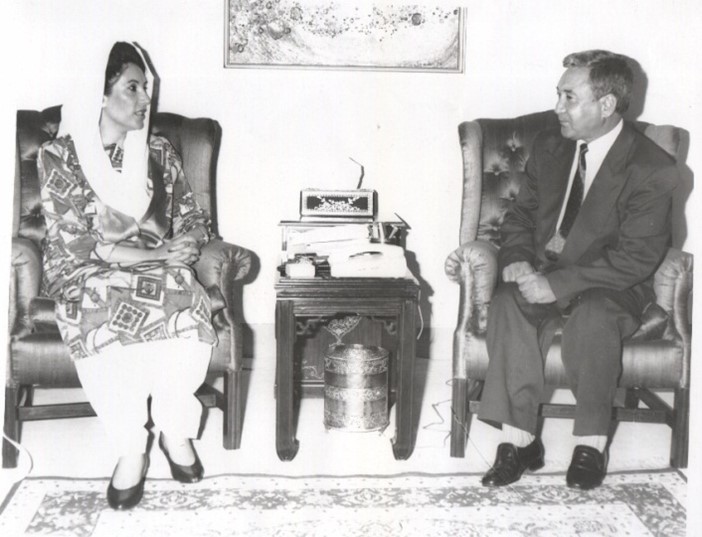Begench Karaev
As you know, Pakistan was assigned one of the key roles in the theater of operations of Afghanistan, but with the end of the direct military involvement of the USSR in Afghan affairs and the end of the Cold War, the role that Pakistan played in world politics was significantly reduced. As noted by the excellent orientalist and expert V. Belokrenitsky, during the 1980s, at the last stage of the positional confrontation between the US and the USSR, Pakistan was in the position of a “front-line state”. Pakistan also found itself on the fault line between China and the Soviet Union, as well as between the latter and the Muslim world. As he further notes, the prospect of the overthrow of the established regime in Kabul seemed to give Islamabad a real chance. However, the collapse of the anti-Soviet coalition after 1991 significantly complicated the task of the Pakistani leadership, which was now forced to act in many ways in defiance of Washington – the former main ally and patron. In addition, the Pakistani authorities were faced with unrest and a split among the Mujahideen, which threatened the emergence of radical forces on the stage. It is not surprising that at that time two trends emerged in the regional policy of Pakistan – radical and moderate. The first consisted in all possible support for the Islamists who were gaining strength, not only Afghans, but also people from other countries, primarily Arab ones. The second is in using the situation to achieve minimal strategic goals, ensuring security and internal unity. The real policy was built taking into account these two tendencies and included contradictory elements. In addition, the Pakistani authorities were faced with unrest and a split among the Mujahideen, which threatened the emergence of radical forces on the stage.
As Sehar Kamran, who was a member of the Senate of Pakistan (2012-2018) and awarded one of the highest state awards “Tamgha-e-Imtiaz”, writes in one of her articles: “Apparently, the Soviet military invasion of Afghanistan served for General Zia , on the one hand, a reason and opportunity to extend its absolute military rule, and on the other hand, to strengthen the geopolitical strategy of Islamabad in the region. Therefore, Pakistan decided to join the US camp and support their strategy of “containment” of the Soviet Union in Afghanistan. With the help of financial and military assistance from the United States and the West, Pakistan contributed to the Afghan resistance and weakened the positions of the USSR in Afghanistan. The withdrawal of Soviet troops from Afghanistan in 1989 and the aggravation of the situation in this country, followed by the outbreak of a civil war, did not contribute to softening relations between Pakistan and Moscow. However, in January 1992, Pakistan announced that it would “stop” all arms supplies to the “mujahideen”.
To a certain extent, this was a manifestation of the fact that with the end of the Cold War, but in the midst of the civil confrontation in Afghanistan, sober heads in the leading circles of Pakistan hoped to strengthen the country’s position in Central Asia, but acting not bypassing Moscow, but together with it or with her consent.
Benazir Bhutto wanted to show the world the importance of Pakistan as a resurgent crossroads of the old silk trade routes between Europe and Asia. In particular, she cited historical examples describing the Khyber Pass, which served not only as a corridor for the conquering armies, but was also an excellent gateway in both directions for trade caravans. She saw beyond Khyber the opening of a vast market of Central Asian countries, similar in culture, religion and history. But as the geographical map suggested to her, the best route ran through Afghan lands through the cities of Kandahar and Herat.
She appointed a 70-year-old retired general, Nasrullah Babar, who agreed to become interior minister, to simultaneously coordinate the work of intelligence agencies to establish a corridor through the almost impassable meanders of the Afghan mountains and valleys controlled by field commanders and their detachments. General Babar first undertook to organize a trade convoy from Quetta to Turkmenistan, which would show the determination of the Pakistani leadership to establish new relations with the young states of Central Asia. Let us note that a little later, the arrival of a trade convoy in October 1994 at the Pakistani-Afghan border near Kandahar coincided with the beginning of the preaching activities of Mullah Omar and his shura in this area.
If we look at previous events that took place then in the southern spurs of the Hindu Kush, then on August 14, 1991, Pakistan celebrated the 44th anniversary of independence and when President Ghulam Ishaq Khan delivered a congratulatory speech, the commander of the special forces, Pervez Musharraf, elevated to the rank of general at the beginning of the year, even he did not think that in 10 years he would accept congratulations as head of state, while retaining the posts of head of the executive branch and the armed forces.
At this moment, more than 4.5 thousand km. northwest of Islamabad, or rather in the capital of the then USSR, the city of Moscow, the Builder’s Day was celebrated at the state level – there is not a builder of communism, and not even a symbolic bricklayer with a famous trowel. On this day, ordinary builders were honored – from a worker to an engineer, emptying glasses, and most often glasses filled with the popular drink of the Union – Russian vodka. And the top of the other “builders”, i.e. “creators” of the communist paradise on earth, tried to somehow establish props under the crumbling walls of the Union – a symbol of a bright future and a common home for a friendly family of socialist republics. To be more precise, on that day the Draft Agreement on the Establishment of the Union of Sovereign States (USS) was published in the country’s central press. The document on the USS actually put an end to the USSR.
Meanwhile, in the countries of Eastern Europe, communist regimes collapsed one after another. Under the pressure of these events, the national movement for secession from the Union and the formation of national states intensified in a number of republics of the USSR. All attempts by the Gorbachev leadership to cope with this movement failed. In early 1991, in the Middle East, in response to the occupation of Kuwait by the troops of the Iraqi dictator Saddam Hussein, an international coalition led by the United States opened hostilities against him, which went down in history as the war in the Persian Gulf. Kuwait was liberated, but Saddam Hussein’s regime was not destroyed at that time.
As Ms. Sehar Kamran writes, many international and military analysts agree that the Soviet war in Afghanistan was a strategic mistake that paved the way for the collapse of the Soviet Union. Without a doubt, the collapse of the Union of Soviet Socialist Republics in 1991 was a turning point in the history of world politics. There has been a huge paradigm shift in the global power structure from a bipolar to a unipolar world order, with the United States of America becoming the most powerful nation in the world. However, contrary to the Winner Takes All principle (winner-take-all), the legacy of the “defeated USSR” then went to young Russia, which took a seat on the UN Security Council as the legal successor of the Soviet Union. Although, it would seem, some “landsknechts of the Cold War” would not be averse to deleting the name of the defeated, moreover, “deceased” founder of the UN from the Security Council. As is done in business, the heir of the deceased founder of a closed joint-stock company is at best given compensation, and not a seat on the Governing Board of Shareholders.
Today it would be interesting to know what the then 39-year-old US Senator from Delaware Joseph Robinette Biden, Jr. thought about this? Relatively young, but already with a solid – with almost 20 years of experience in the US Senate, Joe Biden opposed the Gulf War in 1991, and this did not stop him from advocating NATO expansion in Eastern Europe and the participation of the North Atlantic bloc in the Yugoslav wars of the 1990s, and to support the US invasion of Iraq. Such a question is not accidental, for sometimes some opinion is expressed on the part of individual representatives of the West to apply the principle, “Woe to the vanquished!” (Latin: Vae victis!). This was the immortal exclamation of the leader of the Gauls Brennus, addressed by him, according to legend, to the defeated Romans at the beginning of the third century BC. A catchphrase thanks to the historian Titus Livy, the phrase is mentioned today in an attempt to make up for the supposedly missed opportunity that appeared at the end of the Cold War, which was also a global scale.

About the author: Begench Saparovich Karaev, defended his doctorate in philosophy in April 1996 in Moscow, published several monographs and dozens of articles on the theory and methodology of political analysis, including in relation to the conditions of the traditional Central Asian society. Starting from 1997, over the next almost a decade and a half, he headed the information and analytical structure of the Foreign Ministry of Turkmenistan. From April 2004 to February 2005, he conducted research and lectures at Indiana University Bloomington (Indiana University Bloomington) as part of the targeted program Fulbright for Visiting Scholars (USA). Currently, he is a senior lecturer at the IIR of the Ministry of Foreign Affairs of Turkmenistan.
To be continued . . .
///nCa, 29 December 2022
